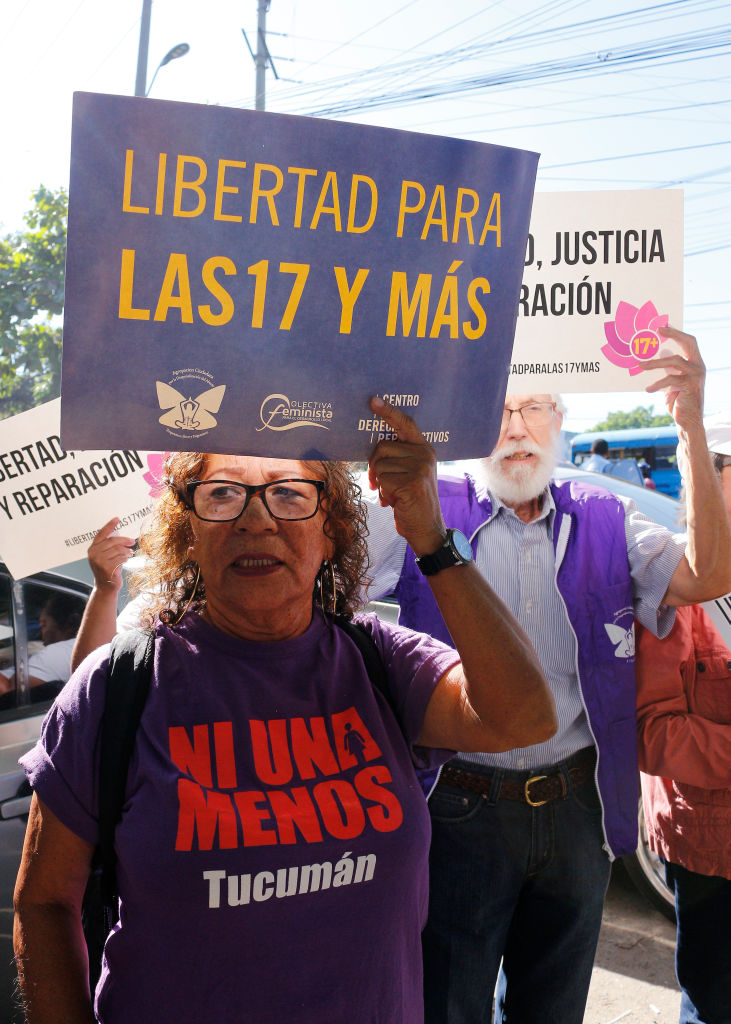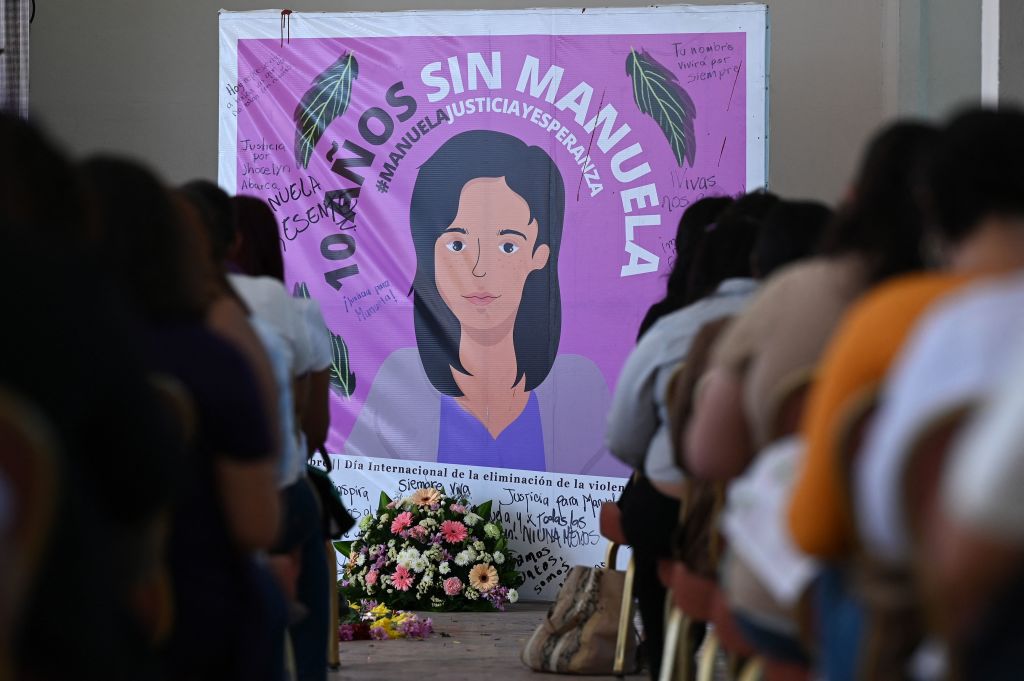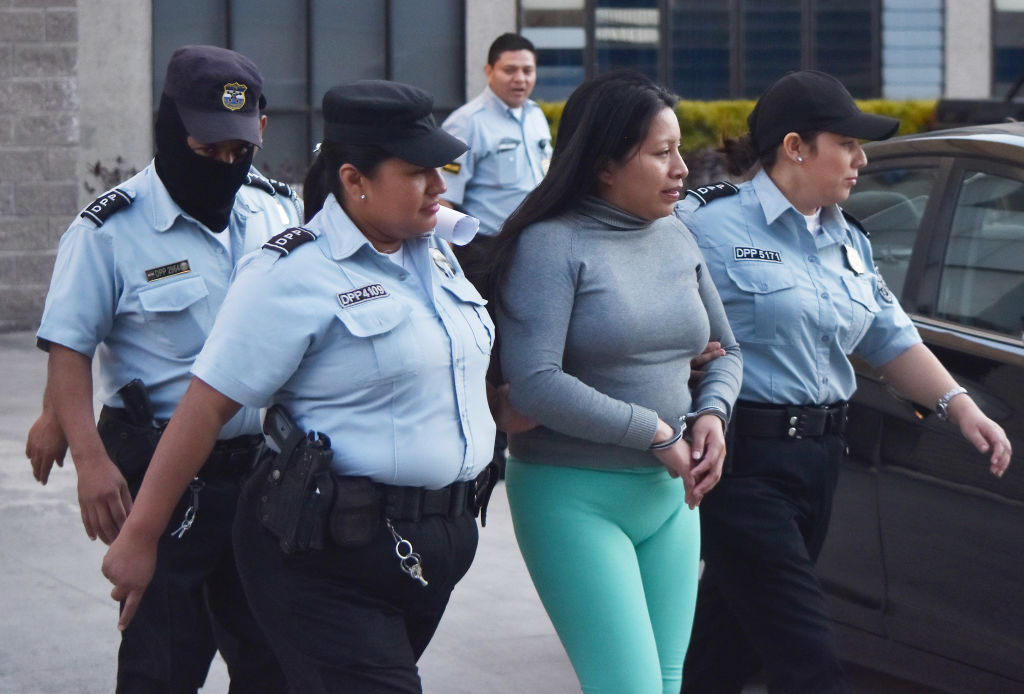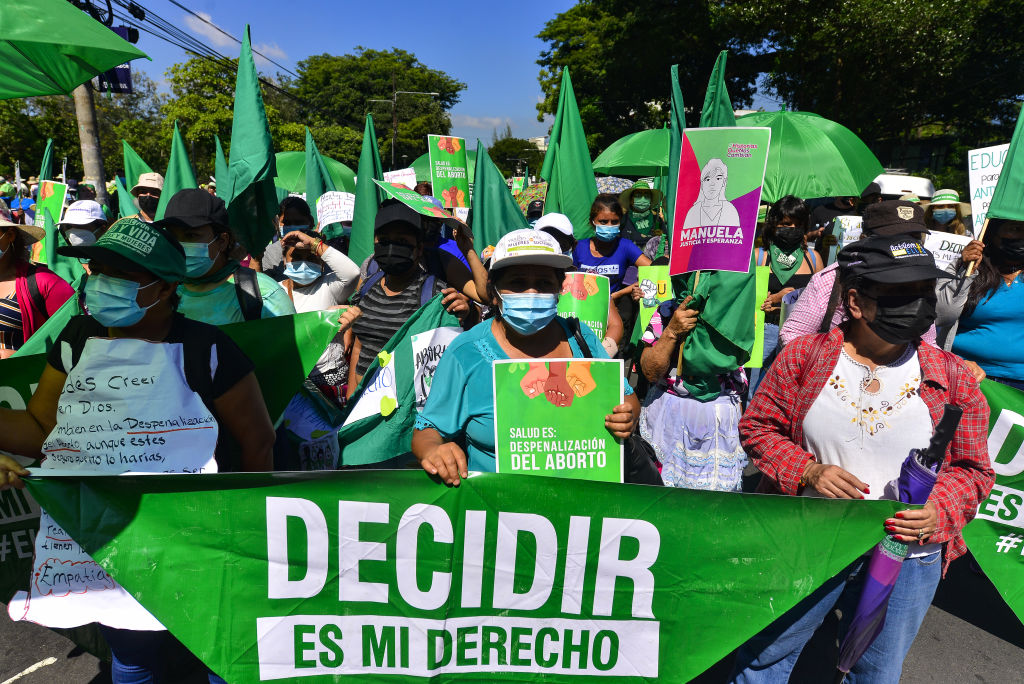SAN SALVADOR, El Salvador—Alba Lorena Santos had just returned home from running errands when her headache began. She saw blood running down her legs. She was five months pregnant.
Santos told her daughter to call their neighbor, a relative by marriage, for help. She fainted shortly after. When she woke up, she remembers the neighbor telling her the baby—a boy—had died.
The next day the neighbor returned and said the police were there to ask some questions. Still sick and feverish, Santos said she was put into a police car and asked: “Why did you kill him? Not even dogs do that.”
It was only later in court that Santos said she was able to piece together what took place over those two December days in 2009.
“The neighbor reported me,” Santos said. “She accused me of killing him.”
Abigail Cortez, a lawyer with the Citizens Association for the Decriminalization of Abortion in El Salvador, said Santos actually had an obstetric emergency, not an abortion, and should have received medical help. Instead, Santos was convicted for aggravated homicide and sentenced to 30 years. The neighbor’s testimony was a key part of the prosecution’s narrative that the baby had been killed, rather than dying as the result of a medical emergency.
Twenty-five years ago this April, El Salvador passed a total ban on abortions—no exceptions for rape, incest, or the health or life of the mother—transforming society in this Central American nation. Now, the ban might finally be overturned.
The Inter-American Court of Human Rights has begun hearing Beatriz v. El Salvador, investigating the case of a woman who was seriously ill from lupus, arthritis, and renal failure but denied an abortion even though the fetus would not survive outside the uterus. The woman died not long after. With this case, the court will rule for the first time on whether the absolute prohibition of abortion violates a woman’s right to life and health.
The court’s verdict could have a far-reaching impact across the Latin American nations that have accepted the jurisdiction of the court by ratifying the American Convention on Human Rights, and set an important precedent for a region that’s one of the most restrictive in the world for abortion. In particular, it could spell the end of total abortion bans in five countries that recognize the court’s jurisdiction: Nicaragua, the Dominican Republic, Haiti, Honduras, and El Salvador.
With over 50 women incarcerated since the ban was passed, El Salvador is one of the most widely documented examples of a country imprisoning women for abortion. The Fuller Project and Foreign Policy have reviewed court documents or pardon requests related to 25 cases from 1999 to 2018 of pregnant women accused of aggravated homicide, attempted aggravated homicide, and abortion. They reveal how the country’s abortion ban made neighbors, doctors, police, and judges—the very people meant to help these women—turn against them instead.
“The system doesn’t seek the truth. It seeks to blame these women,” Cortez said.
But translating a favorable ruling into political change could still prove difficult. The court’s ruling is technically legally binding, but a lack of enforcement mechanism means countries don’t always follow through on implementing their directives. The ban continues to be popular, particularly as anti-abortion evangelical churches with strong connections to the United States have gained influence here, and advocates in El Salvador warn the United States could be heading down its path.
“El Salvador shows us the cruelty of the total criminalization of abortion,” said Cristina Rosero, senior legal advisor for Latin America and the Caribbean for the Center for Reproductive Rights. “Those who face greater barriers to reach the health system are precisely the most persecuted for the crime.”
Santos lived five hours away from the nearest hospital when she lost her child.
“My pregnancy was the result of rape,” Santos said. “Despite this, I’ve always said, if I wanted to abort, I would have done it in the first weeks.”
It would be years before she would see her two daughters again.
“My family abandoned me,” Santos said. “My brothers told me that I was a perra [dog]. One told me that I was a murderer.”
Eventually, Santos came to know other women in prison who were in the same situation as her. She and 16 others formed a group known as “Las 17,” and their lawyers were successful in mobilizing an international campaign for their release. In 2019, after a decade in prison, Santos was finally released, her sentence commuted after the Salvadoran Supreme Court found her rights were violated during her trial.

“They put us between a rock and a hard place,” said Juan José Guzmán, president of the Salvadoran Association of Gynecologists and Obstetricians. “The doctor almost turns into a judge.”
Guzmán has seen it all: hammocks slung on a pole to form a makeshift stretcher for women in labor in rural areas, a woman giving birth in the bed of a pickup truck, others arriving with babies in their arms because the hospital was so far away that they already gave birth.
He recalled that, around the mid-2000s, doctors in the public hospitals in El Salvador were told they had to report any suspected abortions to authorities. If they failed to do so, they could risk prosecution themselves.
Instead of worrying about patients’ care, doctors became worried about the legal repercussions of their actions, he said. Obstetric emergencies posed multiple quandaries: Should I notify the public prosecutor’s office? Should I call the police? Should I examine the patient, or would that contaminate the crime scene? Should I wait for forensic medicine, even though it could take hours? In emergencies, there’s no time to delay. Every second counts.
“These situations are so difficult,” Guzmán said.
In 2019, Cortez and her colleagues successfully sued the Salvadoran state at the Inter-American Court of Human Rights on behalf of Manuela, a woman who they said had arrived at the hospital with postpartum preeclampsia, was refused an abortion, and died soon after from lymphatic cancer while in prison.
The court found that the state had violated Manuela’s rights to life and health and ruled that health care staff should no longer report patients to authorities for suspected abortions. This November, the Salvadoran government finally complied with the ruling and issued a new pre- and postnatal protocol saying doctors should not report patients to authorities and would not be punished for failing to report.

Forensic pathologists, whose autopsies on fetuses play a central role in the cases against these women, also became controversial figures in the medical community.
Jose Miguel Fortín Magaña, the director of El Salvador’s Forensic Medicine Institute from 2010 to 2015, became a highly polarizing figure in the country when he said in 2014 that “the 17” were in prison for infanticide, not abortion, as documented by his institution’s autopsies. In other words, he was claiming their babies were killed after being born alive.
Fortín Magaña said that he recognized deep-seated machismo existed in Salvadoran society, but said he did not believe it could influence autopsies.
“Autopsies don’t have a political affiliation,” he said recently in his office in San Salvador. “They simply spoke of what had been the cause of death of these children.”
“Doctors give hard facts. You can like it or not, but it’s just a hard fact.”
But lawyers for the women have cast doubt on a key scientific test used in these autopsies. The floating lung test, called the docimasia, had been used to prove in court that babies had air in their lungs and were therefore alive outside their mother’s womb at some point before they died.
In the test’s simplest form, the lungs are placed in water: If they float, they are believed to have been filled with air, meaning the baby had taken in breaths of outside air. In El Salvador, this test is often used to elevate the women’s crime to homicide rather than abortion.
Gregory J. Davis, a professor of pathology and laboratory medicine at the University of Kentucky, called the test “invalid in unattended births” and said that the test has been considered unreliable for more than 100 years in an analysis provided to defense lawyers in 2014.
Some form of this test was used on at least 10 of the cases reviewed by the Fuller Project and Foreign Policy. Fortín Magaña defended its use. It has evolved, he said, adding more scientific forms of the examination, such as analysis of lung tissue.
“From a medical perspective, there was evidence of the birth of these children,” Fortín Magaña said.
The role played by doctors in these situations is fraught in other ways as well. Hospitals have direct contact with public prosecutors’ offices to report potential cases of gender violence. However, this often leads to investigations into possible abortions, according to Guzmán and two police sources.
It’s common for police to arrive quickly to question women suspected of abortion.
“The longer you wait, the more the truth is lost,” said police investigator Miguel, who requested his name be withheld as he was not authorized to give an interview.
Under the Salvadoran Constitution, life is defined as starting at conception. This means any abortion case should be investigated as a potential homicide. Miguel arrives on the scene keeping this in mind.
“Your [the woman’s] objective was to abort and that everything went well and you didn’t have to go to the hospital,” he said, explaining how he approaches these cases. “But since the abortion was incomplete, you have a part [of the baby] in your body that can cause your death. So you arrive at the hospital and you [start to] prepare your story.”
“As an investigator, I have to go while you are developing your story and you see that it has holes, so if I take too long, you fill the holes.”
Omar Flores, a lawyer who has worked on these cases, said the ban has created an “attitude of trying to obtain convictions.” For a case to qualify as a homicide, there must be a motive. In suspected abortion cases, Miguel said this could be a failed relationship, rape, or even the mother’s young age or her lack of resources to take care of the baby.
Cortez and her colleagues at the Citizens Association said the police consistently breach protocols in place that are meant to ensure they act with sensitivity toward the women. The Fuller Project and Foreign Policy documented seven abortion-related cases that show the police failing to follow these rules, including one case where an 18-year-old was arrested in the emergency room while being treated for tearing during childbirth. The officer told the court the arrest was justified: “She was conscious,” the officer explained.
Miguel has attended workshops on gender violence and said it has changed how he approaches investigations, especially when dealing with victims who have experienced traumatic events.

Despite these workshops, several lawyers told the Fuller Project and Foreign Policy that machismo still prevails and can be seen in phrases and expressions used in court.
For instance, in one trial the judge defined perinatal asphyxia as “the aggression produced against the newborn baby near the moment of birth because of lack of oxygen,” a definition that assumes culpability and does not have a scientific basis.
Meanwhile, El Salvador has a strikingly low conviction rate for rape and sexual violence.
“I was the victim, and I was considered guilty,” Santos said. “My rapist, who was responsible for everything that was happening to me? He was all fine, outside with his kids and his family.”
The overall landscape remains precarious. Salvadoran President Nayib Bukele once supported loosening abortion restrictions as the mayor of San Salvador for the left-wing FMLN party but has since backtracked after aligning with right-wing politicians to secure the presidency. Women’s rights advocates say the government already dragged its feet in implementing the Inter-American Court’s Manuela ruling on doctors no longer referring women to police for suspected abortions.
Meanwhile, women are still being tried for abortion in El Salvador—eight have ongoing trials. Santos looks forward to the day when women will no longer face this kind of prosecutorial environment.
“I hope more women don’t experience the same situation. When you go through these moments, you feel cornered on all sides,” she said.


 Anna-Catherine Brigida
Anna-Catherine Brigida
